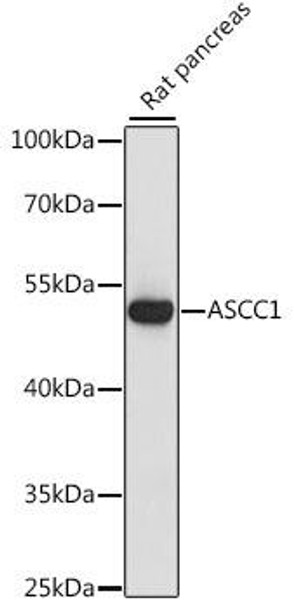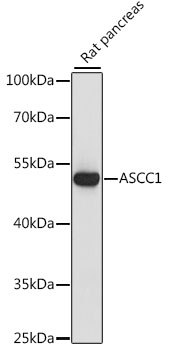Anti-ASCC1 Antibody (CAB15832)
- SKU:
- CAB15832
- Product type:
- Antibody
- Reactivity:
- Human
- Mouse
- Rat
- Host Species:
- Rabbit
- Isotype:
- IgG
- Antibody Type:
- Polyclonal Antibody
- Research Area:
- Epigenetics and Nuclear Signaling
Frequently bought together:
Description
| Antibody Name: | Anti-ASCC1 Antibody |
| Antibody SKU: | CAB15832 |
| Antibody Size: | 20uL, 50uL, 100uL |
| Application: | WB IF |
| Reactivity: | Human, Mouse, Rat |
| Host Species: | Rabbit |
| Immunogen: | Recombinant fusion protein containing a sequence corresponding to amino acids 1-180 of human ASCC1 (NP_001185727.1). |
| Application: | WB IF |
| Recommended Dilution: | WB 1:500 - 1:2000 IF 1:50 - 1:200 |
| Reactivity: | Human, Mouse, Rat |
| Positive Samples: | Rat pancreas |
| Immunogen: | Recombinant fusion protein containing a sequence corresponding to amino acids 1-180 of human ASCC1 (NP_001185727.1). |
| Purification Method: | Affinity purification |
| Storage Buffer: | Store at -20°C. Avoid freeze / thaw cycles. Buffer: PBS with 0.02% sodium azide, 50% glycerol, pH7.3. |
| Isotype: | IgG |
| Sequence: | MEVL RPQL IRID GRNY RKNP VQEQ TYQH EEDE EDFY QGSM ECAD EPCD AYEV EQTP QGFR STLR APSL LYKH IVGK RGDT RKKI EMET KTSI SIPK PGQD GEIV ITGQ HRNG VISA RTRI DVLL DTFR RKQP FTHF LAFF LNEV EVQE GFLR FQEE VLAK CSMD HGVD SSIF QNPK KLHL |
| Gene ID: | 51008 |
| Uniprot: | Q8N9N2 |
| Cellular Location: | Cytoplasm |
| Calculated MW: | 41kDa/45kDa |
| Observed MW: | 46kDa |
| Synonyms: | ASCC1, ASC1p50, CGI-18, SMABF2, p50 |
| Background: | This gene encodes a subunit of the activating signal cointegrator 1 (ASC-1) complex. The ASC-1 complex is a transcriptional coactivator that plays an important role in gene transactivation by multiple transcription factors including activating protein 1 (AP-1), nuclear factor kappa-B (NF-kB) and serum response factor (SRF). The encoded protein contains an N-terminal KH-type RNA-binding motif which is required for AP-1 transactivation by the ASC-1 complex. Mutations in this gene are associated with Barrett esophagus and esophageal adenocarcinoma. Alternatively spliced transcripts encoding multiple isoforms have been observed for this gene. |
| UniProt Protein Function: | ASCC1: Enhances NF-kappa-B, SRF and AP1 transactivation. In cells responding to gastrin-activated paracrine signals, it is involved in the induction of SERPINB2 expression by gastrin. Defects in ASCC1 may be a cause of Barrett esophagus (BE). A condition characterized by a metaplastic change in which normal esophageal squamous epithelium is replaced by a columnar and intestinal-type epithelium. Patients with Barrett esophagus have an increased risk of esophageal adenocarcinoma. The main cause of Barrett esophagus is gastroesophageal reflux. The retrograde movement of acid and bile salts from the stomach into the esophagus causes prolonged injury to the esophageal epithelium and induces chronic esophagitis, which in turn is believed to trigger the pathologic changes. Genetic variants in ASCC1 have been found in individuals with Barrett esophagus and are thought to contribute to disease susceptibility. 2 isoforms of the human protein are produced by alternative splicing. |
| UniProt Protein Details: | Protein type:Transcription, coactivator/corepressor Chromosomal Location of Human Ortholog: 10pter-q25.3 Cellular Component: transcription factor complex; cytoplasm Molecular Function:RNA binding Biological Process: regulation of transcription, DNA-dependent; transcription, DNA-dependent Disease: Barrett Esophagus |
| NCBI Summary: | This gene encodes a subunit of the activating signal cointegrator 1 (ASC-1) complex. The ASC-1 complex is a transcriptional coactivator that plays an important role in gene transactivation by multiple transcription factors including activating protein 1 (AP-1), nuclear factor kappa-B (NF-kB) and serum response factor (SRF). The encoded protein contains an N-terminal KH-type RNA-binding motif which is required for AP-1 transactivation by the ASC-1 complex. Mutations in this gene are associated with Barrett esophagus and esophageal adenocarcinoma. Alternatively spliced transcripts encoding multiple isoforms have been observed for this gene. [provided by RefSeq, Dec 2011] |
| UniProt Code: | Q8N9N2 |
| NCBI GenInfo Identifier: | 311771708 |
| NCBI Gene ID: | 51008 |
| NCBI Accession: | NP_001185727.1 |
| UniProt Secondary Accession: | Q8N9N2,Q5SW06, Q5SW07, Q96EI8, Q9Y307, |
| UniProt Related Accession: | Q8N9N2 |
| Molecular Weight: | 41,228 Da |
| NCBI Full Name: | activating signal cointegrator 1 complex subunit 1 isoform b |
| NCBI Synonym Full Names: | activating signal cointegrator 1 complex subunit 1 |
| NCBI Official Symbol: | ASCC1 |
| NCBI Official Synonym Symbols: | p50; CGI-18; ASC1p50 |
| NCBI Protein Information: | activating signal cointegrator 1 complex subunit 1 |
| UniProt Protein Name: | Activating signal cointegrator 1 complex subunit 1 |
| UniProt Synonym Protein Names: | ASC-1 complex subunit p50; Trip4 complex subunit p50 |
| Protein Family: | Activating signal cointegrator 1 complex |
| UniProt Gene Name: | ASCC1 |
| UniProt Entry Name: | ASCC1_HUMAN |






